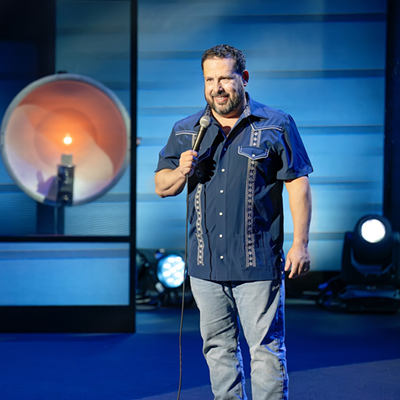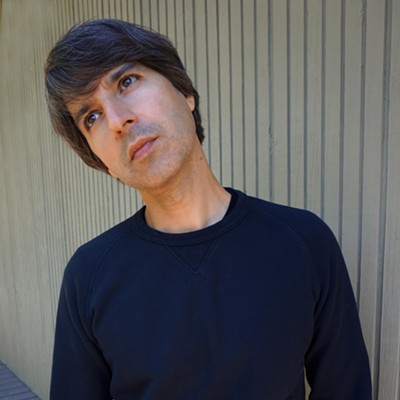Instead, Limberis chose to talk about scholarships the foundation was scheduled to provide UA students. As the president of the Hellenic Cultural Foundation for approximately eight years, Limberis was passionate about its mission to promote and secure modern Greek studies at the UA.
"In his last days, it was one of his concerns," says Voyatzis. She recalls that Limberis prepared the scholarship paperwork from his bedside. "He said, 'Make sure those students get the checks.' It was the last conversation I had with him."
Limberis died on Nov. 5, 2005.
Limberis' media colleagues held the veteran reporter with the Arizona Daily Star and Weekly in high regard. With more than 20 years of experience, he had a zeal for journalism. But those who knew him outside the business saw his other passion: the Hellenic Cultural Foundation.
Established in 1984, the foundation set out to secure a program in modern Greek studies at the UA. In 1985, Dr. Stratos Constantinidis became the university's first full-time modern Greek language instructor, as a result of a successful fundraising campaign. Key founding members who worked on the appointment were Pete Kotzambasis (former owner of El Greco Restaurant), Rev. Anthony Moschonas (St. Demetrius Church), UA professor Dr. Richard Kinkade, UA regents professor Dr. David Soren and the late James Sfarnas.
Voyatzis joined the program in 1986, replacing Constantinidis. She was granted tenure in 1994. In the '90s, the program expanded and added two additional instructors.
"Since 1985, there has been a modern Greek program with the classics department," says Voyatzis. "The efforts of the foundation made modern Greek studies at the university really happen. People have worked hard to do this, not necessarily because they have big pockets, but because they care deeply about the cause of having modern Greek studies. To have a modern Greek program of this caliber in Tucson is a remarkable achievement, because it's on par with some of the best in the country.
"Once the positions were secured, the foundation turned (its) attention to (offering) scholarships to students who major in Greek language or civilization.
"Chris was one of the people on the scholarship committee. Every year, the foundation gives up to three scholarships to students in the classics department," explains Voyatzis. And this year, the foundation is starting a scholarship in honor of Limberis.
"Chris was dedicated to and passionate about the cause of the foundation, with a mission to support modern Greek studies at the UA in the classics department. For that reason, we thought it fitting to establish a scholarship in his name for outstanding students in Greek language and civilization.
"Like a number of members, Chris was very proud of his Greek heritage. Even though he didn't have kids, he wanted to make sure the Greek kids had the opportunity to learn Greek and learn about their heritage. ... Interviewing the students was one of the highlights of his life. It gave him a lot of pleasure."
Limberis also enjoyed talking about the foundation's support of an excavation project at the Sanctuary of Zeus on Mt. Lykaion. The sanctuary is 17 miles from Olympia, the site of ancient athletic games. "He knew it was a big deal for Americans to get a permit to dig in Greece. We were extremely lucky to get it," says Voyatzis.
An illustrated talk on "Investigating the Birthplace of Zeus on Mt. Lykaion, Greece" will be presented by the Hellenic Cultural Foundation of Tucson in memory of Chris Limberis on Saturday, Feb. 11, at the Hellenic Center, 1145 E. Fort Lowell Road. Social hour begins at 5 p.m.; dinner begins at 6 p.m. Tickets are $25. Seating is limited. Call 888-0505 for information.
After the social hour, foundation president Dr. Angela Zerdavis will speak about Limberis; the presentation will follow. The speakers will be Dr. George Davis, UA provost; Dr. David Romano of the University of Pennsylvania Museum; and Voyatzis.
Voyatzis visited the Sanctuary of Zeus during the summers of 2004 and 2005. "The site was strikingly similar to the Sanctuary of Zeus at Olympia. There are remains of a stadium for races, a bathhouse and fountain with lots of remains in the lower sanctuary. In the upper sanctuary, there is an ash altar to Zeus. Ash is the result of the burning of sacrifices at the altar."
Voyatzis explains typical ritual sacrifices were of goats and sheep, but there is another possibility.
"There are disturbing rumors of human sacrifices. We want to explore that and see if there is any archeological truth to that." Other goals of the excavation include determining the age of the site and conducting an archaeological survey.
Plans for the presentation about the excavation were underway when Limberis was alive. Voyatzis says he was excited to hear about the project.
"We used to have meetings at El Greco. Chris would bring in an old Greek map. It was ancient. He'd say, 'OK, Mary, show me where the site is.' He was so pleased."
Limberis never visited Greece during his lifetime. But perhaps from his new perch in the heavens, he can see it clearly.







